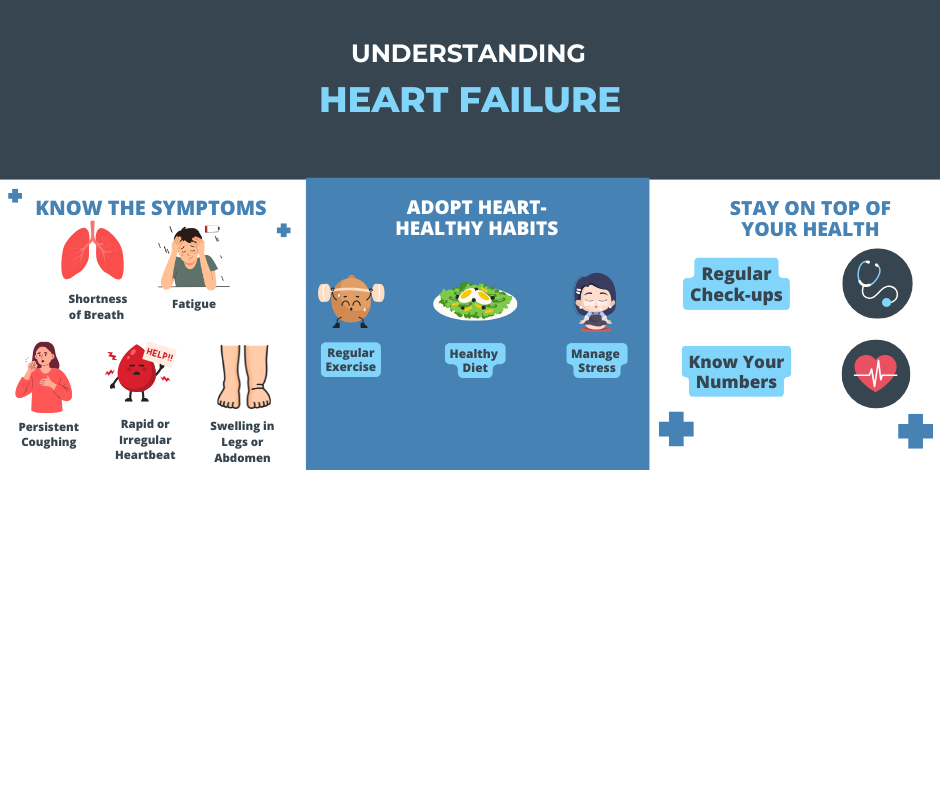
Heart disease is the leading cause of death in Oklahoma, accounting for one in four fatalities. While there are many types of heart disease, heart failure is prevalent in our state and often misunderstood.
Heart failure occurs when the heart is unable to pump blood efficiently enough to meet the body’s needs. It doesn’t mean the heart has stopped working entirely, but it indicates that it’s struggling to perform its essential functions. This condition can result from various underlying health issues, including coronary artery disease, high blood pressure, diabetes, or damage from a heart attack.
Common symptoms include shortness of breath, persistent coughing, swelling in the legs and abdomen, fatigue, and rapid or irregular heartbeat. These symptoms can vary in severity, and many patients may initially dismiss them as signs of aging or a less serious issue.
Living with Heart Failure
For those diagnosed with heart failure, daily life can present significant challenges. Tasks that were once routine—such as walking upstairs or carrying groceries—can become exhausting. Many individuals experience frequent hospital visits, medical interventions, and adjustments to their medications as their condition progresses.
John Bell, a Stillwater resident, is living with congestive heart failure. He and Chris, his wife of 58 years, retired early so they could travel and “do the things people always dream of doing.” They sold their house in California, bought a motorhome and spent nine years on the road. They visited 49 states and 10 provinces of Canada before the birth of grandchildren compelled them to settle in Stillwater.
John’s health issues have progressed over the years and his condition keeps him from doing the activities he once loved.
“He doesn’t have a whole lot of energy. He still wants to do stuff, but he can’t. He gets frustrated with himself,” Chris said.
Emotional health is also affected when it comes to heart failure. Feelings of anxiety, depression, and frustration are common as individuals navigate the physical limitations and lifestyle changes required to manage the condition. A strong support system can play a crucial role in helping patients cope.
Michelle Bero is a registered nurse in the Stillwater Medical Cardiology Clinic. She emphasizes the importance of emotional health in patient care and is committed to excellence in patient treatment. She focuses on educating her patients with compassion so she can help them face the road ahead.
“I connect with my patients where they’re at and get to know their specific needs,” Bero said. “I want them to be educated about what’s happening and where we are going, but it’s more than that. I care about them on an emotional level,” Bero said.
Advancements in treatment and technology offer hope. Medications such as beta-blockers, ACE inhibitors, and diuretics can improve heart function and alleviate symptoms. In more severe cases, devices like implantable defibrillators or ventricular assist devices, and even heart transplants, may be necessary.
Preventing Heart Failure
While heart failure can be a result of underlying conditions or genetic predisposition, many cases can be prevented or delayed through proactive health management.
Maintain a Healthy Lifestyle: Regular physical activity, a balanced diet, and adequate sleep are key to keeping your heart in good condition. Focus on heart-healthy foods such as fruits, vegetables, whole grains, lean proteins, and healthy fats. Limit consumption of processed foods, sugar, and sodium.
Control Risk Factors: High blood pressure, high cholesterol, and diabetes are major contributors to heart failure. Managing these conditions with the help of a healthcare provider can significantly reduce your risk. Regular checkups and monitoring are essential.
Avoid Tobacco and Limit Alcohol: Smoking damages blood vessels and weakens the heart, while excessive alcohol consumption can lead to cardiomyopathy, a condition that directly contributes to heart failure.
Stay Active: Engaging in regular aerobic exercise, such as walking, swimming, or cycling, strengthens the heart and improves circulation. Even moderate levels of activity can have significant benefits.
Manage Stress: Chronic stress and poor stress management can harm the heart over time. Techniques such as mindfulness, yoga, and deep breathing can help you manage stress effectively.
Heart failure is a serious condition, but with awareness, proper management, and preventative measures, its impact can be mitigated. In celebration of American Heart Month, Stillwater Medical Center is hosting a Function Not Failure education class on February 12 from 4 to 6 p.m. This event is free and open to the public, but registration is encouraged. Those interested can contact Bero at 405-533-4583 or mbero@stillwater-medical.org.
“Treatment is changing at a rapid rate, and I love to educate patients,” Bero said. “There’s so much we can do to care for ourselves and one another.”
If you’d like to better understand your risk for heart disease, Stillwater Medical Center also offers cardiovascular screenings. These are available at a self-pay rate of $50 with no physician referral needed. You can schedule a screening at the location of your choice: Stillwater Medical Center, 405-742-5622; Stillwater Medical Perry, 580-710-3145; or Stillwater Medical Blackwell, 580-363-9470.







